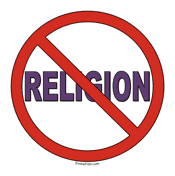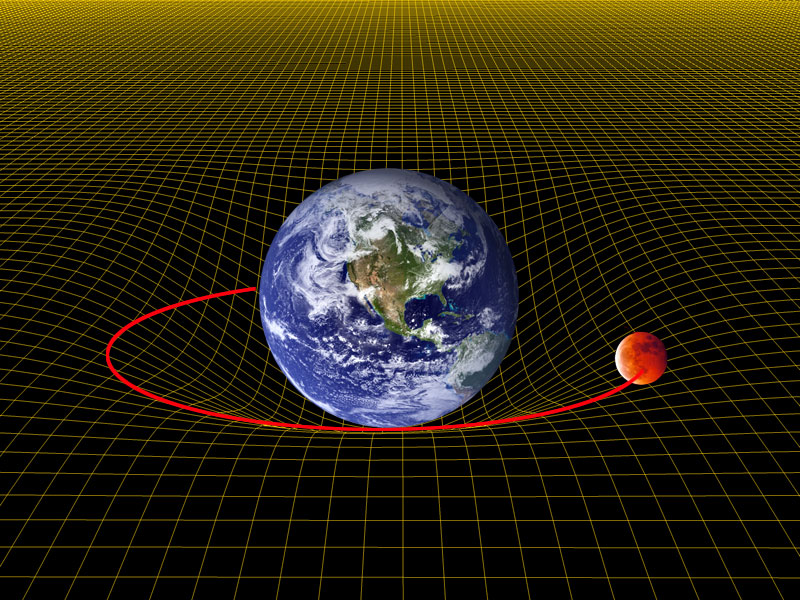You know what makes me angry? The Christian religion and its prominent pastors today look too much like the Jewish religion and Judean leadership of Jesus’ day:
NAB Matthew 23:15 "Woe to you, scribes and Pharisees, you hypocrites. You traverse sea and land to make one convert, and when that happens you make him a child of Gehenna twice as much as yourselves.
Jesus wasn’t warning Jews about being Jewish. He was a practicing Jew! But he saw in the Judaism of his day what we are seeing in Christianity today. Jesus saw religion perverting faith. He saw that it was killing people spiritually. And he didn’t like that.
Religious people, he said, are children of the Hinnom Valley (Gehenna), a site of child sacrifice to idols, a valley just south of Jerusalem’s ancient walls where the garbage burned day and night. Could Jesus have expressed any clearer his view of religion?
What Is Religion?
Religion is any program that promises heaven, nirvana, enlightenment, peace, happiness, or the like. It begins with the observation that you don’t have these things, and the assumption that you can’t get these things unless you _______________ [fill in the blank].
Religions, all of them, including the Christian religion (not to be confused with knowing and trusting Jesus), put it all back on you. You have to please the gods by doing something to fix things up with them.
The Christian religion, however, has competing teams. Most of those teams want to recruit you, usually by trying to persuade you that their method is the one that works in terms of fixing you up with “God.” Some go a step further by discrediting the other teams. After all, there can only be one right religion. Right? Then it follows that within the Christian religion there can only be one right practice. Right?
The irony in this line of reasoning is that it is religion itself that is wrong, if the Jesus of Scripture is to be believed. The Judaism of Jesus’ day was, in his estimation, a hellish, legalistic, burdensome, condemning, cruel religious program. Its leaders, he said, had become children of the devil and a brood of vipers. He railed against them.
Matthew 21:13 "It is written, 'My house shall be called a house of prayer’; but you are making it a den of robbers."
John 2:16 "Take these things out of here! Stop making my Father's house a marketplace!"
Religion and religious leaders outraged Jesus, and rightly so. Outrage is the appropriate emotion when something is outrageous. And the sacrificial system in the temple in Jerusalem, as Jesus saw it, had become a religious racket. Today’s religions are no different.
Why Does Religion Appeal to People in the First Place?
Billions of people, including you and me if we are honest, are snookered by too-good-to-be-true religious spiels of one flavor or another. We human beings seem to be tailor-made suckers for it! And I think I know why.
It’s about your conscience. No, Sigmund Freud didn’t make that word up and stick it in our vocabularies. The word is in the Bible 30 times. The New Testament Greek word is suneidesis, and it refers to that “thing” inside of you that distinguishes what is good from what is evil. The Bible calls that thing your suneidesis. In English, that’s your conscience.
It is said that you should let your conscience be your guide, but the Bible disagrees. It’s not that your conscience isn’t a handy thing to have sometimes, but it can be wrong, warns Scripture. It speaks of a weak conscience, a defiled conscience, and even an evil conscience.
Hebrews 10:22 . . . let us approach with a true heart in full assurance of faith, with our hearts sprinkled clean from an evil conscience . . .
Wow! With a warning like that, it seems wise to use your conscience as a reference, not your guide. Your conscience can condemn you when no one else is, including God.
Remember the new covenant in Jesus' blood:
Hebrews 8:12 For I will be merciful toward their iniquities, and I will remember their sins no more.
If your sins are forgiven and forgotten as far as the Lord is concerned, then who do you think might be condemning you now? Why do you feel condemned all the time? What flawed interior judge constricts you and convicts you and contradicts God’s mercy to you in Jesus? It’s your conscience.
The Genesis story of “the fall” comes to mind. A friend of mine, Australian medical doctor Bruce Wauchope, points out something that makes perfect sense. In the story of Eden, what was the name of the tree that the Lord God tried to protect Adam and Eve from? It was the tree of the knowledge of good and evil. Bruce says that this story is describing how human beings came to have consciences! (Remember the Biblical definition of conscience. It’s the thing inside of you that distinguishes good from evil.) If Bruce is right, and I think he is, then our conscience is a product of “the fall.”
Do you still want to use your conscience as your guide? If so, consider this. In the story, the Lord God knew Adam and Eve would be better off without one! Why? There are many reasons why:
- Our consciences force us to judge ourselves as good or evil based on our performance, and when it comes to self-judgment, our consciences are unkind.
- Our consciences can over-function, restricting us unnecessarily, and robbing us of the freedom to enjoy life.
- Our consciences can project self-judgment onto others, damaging relationships and isolating us.
- Our consciences can be weak, forcing us to fight constantly to do the good thing rather than the evil thing.
- Our consciences may tell us what the good thing is, but when we find that we can’t do the good thing, our consciences judge us as not being a good person.
- Our consciences may tell us what the evil thing is, but when we find ourselves doing the evil thing, our consciences judge us as evil persons.
Your conscience, then, biblically speaking, is an unfortunate result of the fall in Eden. It’s a resource that can sometimes help you distinguish good from evil, admittedly. But it’s a merciless judge also, quick to condemn you for doing what is evil and failing to do what is good.
Let’s get back to religion. (Oh, joy!)
The story of Adam's and Eve’s “fall” depicts the birth of religion. We spend much of our lives hiding behind bushes and fig leaves, mightily struggling with right and wrong, seeing what is good but unable to do it, seeing what is evil and ending up doing it, and moment by moment condemning ourselves for our weakness and failure, ready to do anything to fix it all up. What in the world can we do to fix it all up?
Religion relies on your conscience. There is no religion without it. Religion counts on the undeniable fact that your conscience is both a spiritual hypochondriac and a hanging judge. Your constant internal self-uncertainty and self-condemnation have made you an easy mark for religious programming, even doomsday cults. Religion banks on your conscience forever preaching to you what is right and wrong, while forever condemning you for failing to do good and avoid evil.
Y’all, there is a counterfeit gospel out there—omnipresent in our culture—that is merely echoing the message of your own jittery, judging conscience.
That is why we are susceptible to religion. This unstable conscience of ours puts us in a panicked state, not unlike Adam and Eve in Eden. When they ate the fruit, they were shocked that the first thing and the most horrifying thing that they saw were themselves. They saw themselves, not through the eyes of their friend, the Lord God, but through the lenses of a fallible human conscience, this “thing” in us that has the ability to discern good and evil (sometimes). They looked such a mess to themselves, and they condemned themselves for their action, and they were certain that the Lord God was going to kill them for what they’d done.
Each of us are self-evident messes. We’re hurting, broken, confused, angry, vulnerable creatures who mess up. But we also, deep inside, want to be happy and free. So what can we do? We can try to be so good that our consciences will shut up. Or we can try to be so bad that our consciences will give up. Either way, we want the pain to go away, and we want to believe that it is possible to make that happen, somehow, someway. But how?
 That’s where religion comes in. Religion promises a plan to fix everything. It has programs. But what too few realize is that religion uses our own consciences against us. With the encouragement of today’s scribes and Pharisees of Christian media, our weakness can be exploited. It’s not that hard, really, to convince us that the eyes of our consciences are the eyes of God. We tend to do that anyway.
That’s where religion comes in. Religion promises a plan to fix everything. It has programs. But what too few realize is that religion uses our own consciences against us. With the encouragement of today’s scribes and Pharisees of Christian media, our weakness can be exploited. It’s not that hard, really, to convince us that the eyes of our consciences are the eyes of God. We tend to do that anyway.
Religion, like the serpent in the garden, has no problem convincing us that we are not like God, or that we are not made in his image. The Christian religion, especially in modern evangelical circles, makes “God” in our own consciences’ image. He’s a legal “God” who is obsessed with good and evil, right and wrong. This conscience-god is a judge. And we stand before this judge condemned.
Once a person equates his own conscience with God, he’s primed for the hamster wheel. Just look at every book title from major televangelists today, even the subtle ones. They all give you a program. They tell you how to be the best you can be, how to know that you’re saved, how to unlock the storehouse of heaven, how to get your miracle, how to take your spirituality to the next level, and on and on.
The legal god of your conscience requires that you work yourself out of this mess, or I should say perceived mess. There are do-gooder lists to please “God.” There are steps to salvation. And there are keys to prosperity. Don’t laugh. These programs are selling. Add desperation to the condemning voice of your own conscience-god, and you are ready for religion.
Here’s modern evangelicalism’s hamster wheel:
The bad news is that you are separated from “God” because you are a sinner. You’ve displeased “God,” and you know it. “God” can’t come near you and your dirty sins, and he has no alternative but to punish you forever. (That’s the setup for the hamster wheel.)
BUT, “God” doesn’t really want to punish you, they say, though he will if you are unresponsive to his offer. There is a tiny loophole in the law. You have a chance to get saved from “God’s” punishment. It involves a procedure:
- The Sinner’s Prayer: To become a Christian, you must confess that you’re a sinner, and that you deserve punishment, and you must repent of every evil thing you’ve done, and state that you believe Jesus died for your sins and rose from the dead, and promise from this moment to change and do good, and ask Jesus to come into your heart and save you from the punishment of “God.”
- Church Attendance and Contribution: A real Christian, a person who has sincerely prayed the sinner’s prayer, joins and attends and gives money to a church. That’s walking the Christian walk. That’s the way to stay saved and thus avoid backsliding.
- Daily Prayer and Bible Reading: A real Christian has a daily discipline, preferably very early in the morning, of prayer time and Bible reading. At least thirty minutes.
- The Rules: A real Christian doesn’t smoke, drink, do drugs, have sex outside of marriage, gamble, or cuss. He obeys all of the Ten Commandments. And he listens only to Christian music.
What if you follow these steps, but you slip up? No worries. There are thousands of books and videos showing what you did wrong and how to fix it. Maybe you aren’t running hard enough. Maybe distractions, family curses, or addictions are causing you to fall off. Maybe it’s your attitude. Maybe it’s your lack of communication skills. Maybe you don’t know the Bible well enough. Maybe you weren’t as sincere as you should have been when you prayed the sinner’s prayer. Whatever your failure, there is a product to fix it. That’s what religion is for. It’s there to help you get and keep things fixed up with God to avoid his punishment.
Show Us the Father and We Will Be Satisfied
John 14:8-9 Philip said to him, "Lord, show us the Father, and we will be satisfied." 9 Jesus said to him, "Have I been with you all this time, Philip, and you still do not know me? Whoever has seen me has seen the Father.”
We have Philip’s disease. We think of Jesus and the Father as being different. We see God like our consciences: obsessed with good and evil, legalistic, judging, and condemning. But we see Jesus as a bit more user-friendly! He speaks of mercy and grace.
Do you know what modern evangelicalism does with this? Rather than correct Philip’s error, as Jesus did, it accentuates these false differences. The Father is an angry watcher-god who intends to punish you, they say. But, since somehow he still loves you(!), his loving side sends a sinner-friendly Jesus to the world to offer a stay of execution.
Do you see what this means? It means that “God” sent Jesus to save us from himself! And if that’s not crazy enough for you, some modern evangelicals go so far as to say that Jesus came to let “God” vent his anger on him instead of us!
It’s so easy to blow this boat out of the water. Actually, Jesus already did it 2000 years ago, and we’re still not listening because we have Philip’s disease. Jesus is just so different than what we expect God to be like. But Jesus came to show us exactly what God is like. He and the Father are One, he said. To see him, Jesus assured Philip, is to see the Father.
Jesus’ mercy and grace look nothing like our god-consciences’ legalism and condemnation, do they. So, something is wrong. If Jesus is the very image of the invisible God (Colossians 1:15), and if in him all the fullness of God was pleased to dwell (Colossians 1:19), then maybe we’ve got God the Father all wrong. Maybe our consciences fooled us. Unlucky for us, religion is tailor-made for fools.
 The Un-Religion
The Un-Religion
True Christianity is the un-religion. It’s a non-religion. Moreover, real Christianity is the end of all religion. Religious people are dancing with a corpse and don’t know it. Here’s why.
Is it our desire to reach a distant God? In Jesus, God reached us. Is it our desire to make things right between us and God? In Jesus, we are reconciled to God making everything right. Is it our desire to escape the prison of sin and death? In Jesus, sin and death are defeated. This is the message of the Bible. No religious fervor necessary on our part. Jesus did it all.
But what about my conscience? It’s still going off! It still knows I’m not good enough. It knows oh too well that I’m a sinner, that I don’t do the right thing, that I often do the evil thing, that I hide these truths about myself, and that I pose myself, propping up my pretend-self. It may be true that Jesus has fixed everything up and religion is dead, but what if I don’t feel that way?
That’s where trust comes in. You can stop all the religious striving, and you can rest in the biblical message that God in Jesus has reached you, reconciled you, saved you from sin and death, and raised you. Or you can prefer to believe that your condemning conscience is right: that you are on death row begging for a deal.
The choice is yours, but before you make it, look at the Hebrews quote about an evil conscience once more.
Hebrews 10:22 . . . let us approach with a true heart in full assurance of faith, with our hearts sprinkled clean from an evil conscience . . .
Hebrews acknowledges that our consciences can be evil, condemning us when God is not. But he invites us to approach the Father who in the Son is already near. He invites us to have hearts full of assurance, hearts resting in God’s nearness and mercy. John put it like this:
1 John 3:19-21 And by this we will know that we are from the truth and will reassure our hearts before him 20 whenever our hearts condemn us; for God is greater than our hearts, and he knows everything. 21 Beloved, if our hearts do not condemn us, we have boldness before God;
Hebrews and John pretty strongly imply that we can have our hearts sprinkled clean of an evil conscience, and that we need not listen to our condemning hearts, and that we can trust that God is greater than our hearts, and that we can believe that it is even possible for our hearts to stop condemning us. How bold we might be if the voice of condemnation would stop!
The good news of The Un-religion is that you don't have to work your way to God the Father to get forgiven. He came to you with unconditional forgiveness in God the Son. So why not just say "thanks," and then ask him to help you make your condemning conscience shut up!
This blog was posted as a feature article in Plain Truth Magazine. Great layout: The UN-Religion
 When Jesus prays prior to a miracle, something he rarely does, he looks up to heaven (once in Matthew, twice in Mark, once in Luke, and once in John). For example,
When Jesus prays prior to a miracle, something he rarely does, he looks up to heaven (once in Matthew, twice in Mark, once in Luke, and once in John). For example,












